

A Seven-Step Framework for Developing Business. Lawyers are always seeking ways to get more business.
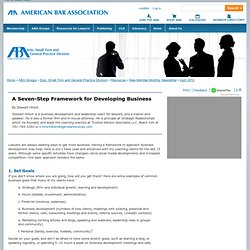
Having a framework to approach business development may help. Here is one I have used and enhanced with my coaching clients for the last 15 years. Although some specific activities have changed—since social media developments and increased competition—the basic approach remains the same. Elevator pitches. The Disciplined Pursuit of Less. By Greg McKeown | 10:00 AM August 8, 2012 Why don’t successful people and organizations automatically become very successful?
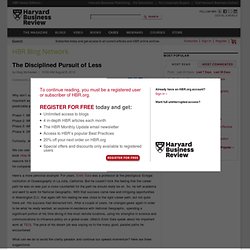
One important explanation is due to what I call “the clarity paradox,” which can be summed up in four predictable phases: Phase 1: When we really have clarity of purpose, it leads to success. Phase 2: When we have success, it leads to more options and opportunities. Phase 3: When we have increased options and opportunities, it leads to diffused efforts. Curiously, and overstating the point in order to make it, success is a catalyst for failure. We can see this in companies that were once darlings of Wall Street, but later collapsed. Here’s a more personal example: For years, Enric Sala was a professor at the prestigious Scripps Institution of Oceanography in La Jolla, California. What can we do to avoid the clarity paradox and continue our upward momentum? First, use more extreme criteria. Second, ask “What is essential?” The 7 Pillars of Connecting with Absolutely Anyone.
How to Be More Charismatic: 10 Tips. Social Media Marketing Mistake Every Small Business Makes. You constantly extend your virtual handshake in every possible direction... yet no one embraces it.
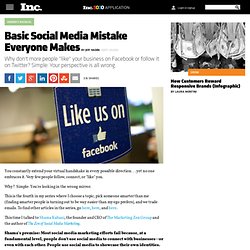
Very few people follow, connect, or "like" you. Why? Simple: You're looking in the wrong mirror. This is the fourth in my series where I choose a topic, pick someone smarter than me (finding smarter people is turning out to be way easier than my ego prefers), and we trade emails. To find other articles in the series, go here, here, and here. This time I talked to Shama Kabani, the founder and CEO of The Marketing Zen Group and the author of The Zen of Social Media Marketing. Shama's premise: Most social media marketing efforts fail because, at a fundamental level, people don't use social media to connect with businesses--or even with each other. Make a Great First Impression: 7 Smart Tricks. Research shows that customers decide whether or not they want to work with you within two seconds of meeting you face to face.
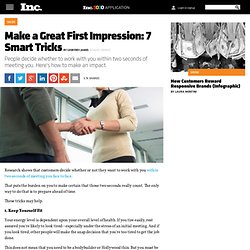
That puts the burden on you to make certain that those two seconds really count. The only way to do that is to prepare ahead of time. These tricks may help. 1. Keep Yourself Fit Your energy level is dependent upon your overall level of health. What Successful People Do With The First Hour Of Their Work Day. Remember when you used to have a period at the beginning of every day to think about your schedule, catch up with friends, maybe knock out a few tasks?
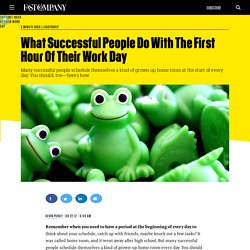
It was called home room, and it went away after high school. But many successful people schedule themselves a kind of grown-up home room every day. You should too. The first hour of the workday goes a bit differently for Craig Newmark of Craigslist, David Karp of Tumblr, motivational speaker Tony Robbins, career writer (and Fast Company blogger) Brian Tracy, and others, and they’ll tell you it makes a big difference. Here are the first items on their daily to-do list. Don’t Check Your Email for the First Hour. Why Too Much Data Disables Your Decision Making. Quick, think back to a major decision.
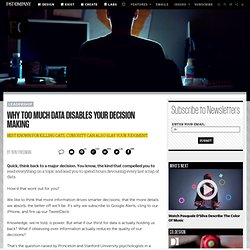
You know, the kind that compelled you to read everything on a topic and lead you to spend hours devouring every last scrap of data. How'd that work out for you? We like to think that more information drives smarter decisions; that the more details we absorb, the better off we'll be. It's why we subscribe to Google Alerts, cling to our iPhone, and fire up our TweetDeck. Knowledge, we're told, is power.
That's the question raised by Princeton and Stanford University psychologists in a fascinating study titled On the Pursuit and Misuse of Useless Information. Their experiment was simple. Bad Service Can Be Good Business - Bill Taylor. By Bill Taylor | 9:30 AM August 8, 2012 It’s hard not to be surprised by what you read in the newspapers these days, but a recent report in the New York Times left me downright floored.

Richard Bove, a high-profile securities analyst who focuses on bank stocks, wrote a commentary that excoriated Wells Fargo for lousy service — so much so that he announced he’d moved his business to a different bank. But that same commentary praised Wells Fargo as a company and upgraded its stock to a buy! Bove’s basic argument? 10 Ways You Should Never Describe Yourself. Picture this: You meet someone new.

"What do you do? " he asks. "I'm an architect," you say. "Oh, really? " 9 Keys to Business & Career Success. I'm fortunate enough to know a number of remarkably successful people.
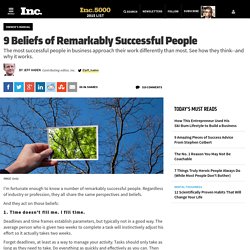
Regardless of industry or profession, they all share the same perspectives and beliefs. And they act on those beliefs: